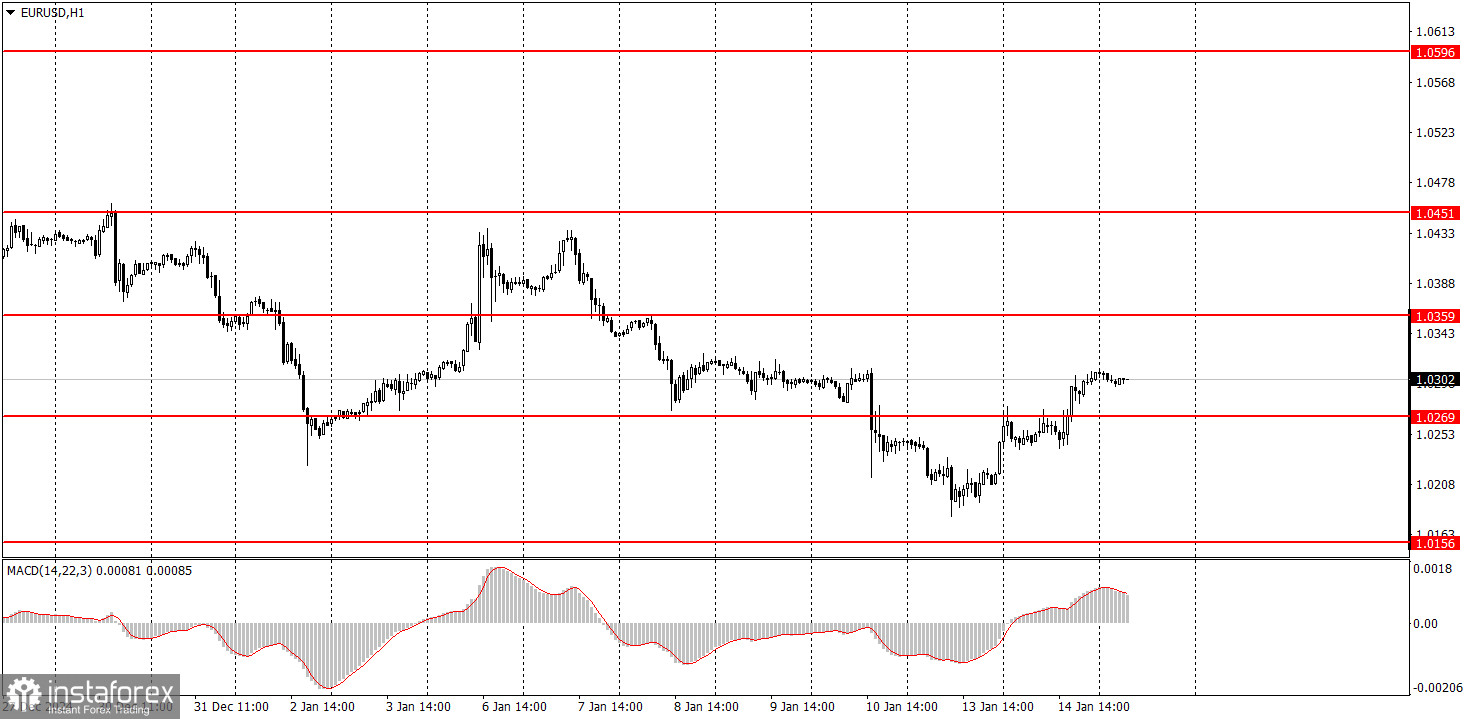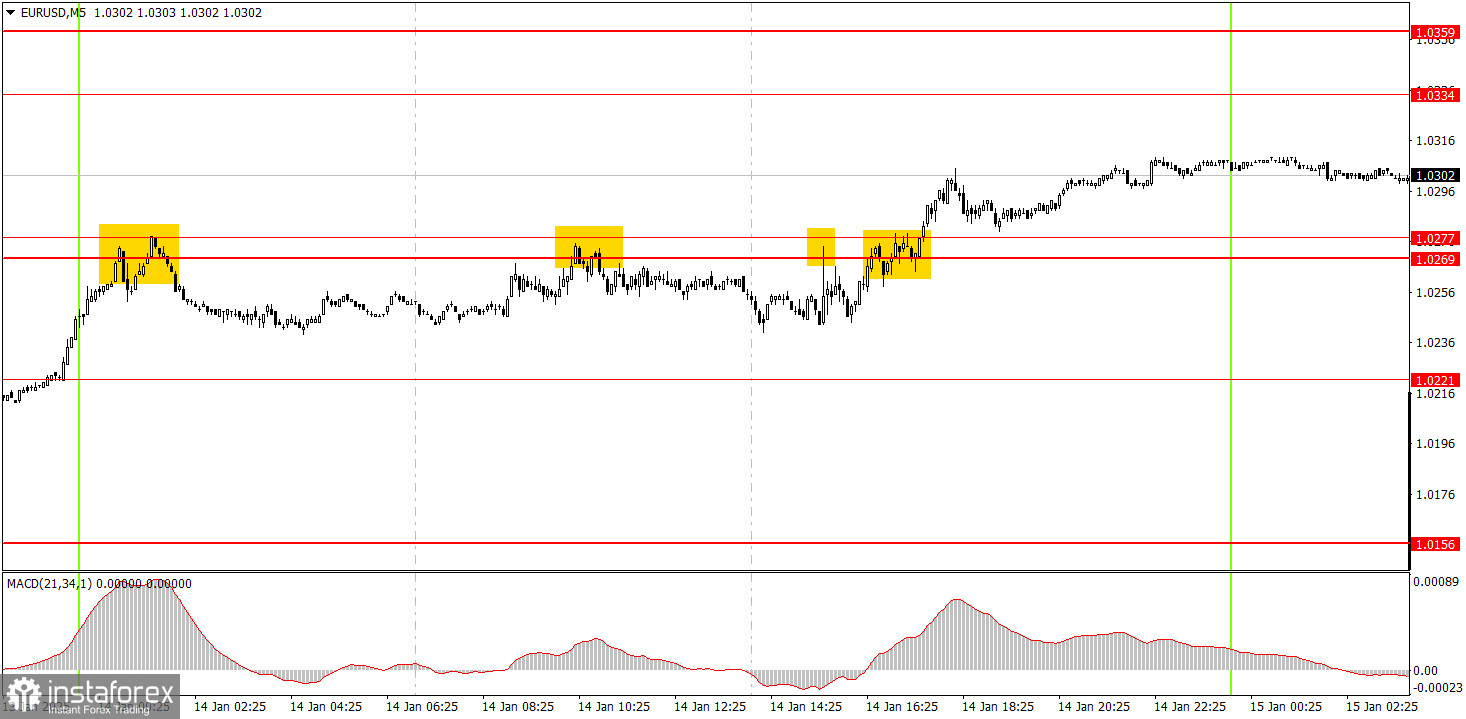Analysis of Tuesday's Trades
1H Chart of EUR/USD

The EUR/USD currency pair continued its correction on Tuesday, following a recent downward movement in the overall bearish trend. There were no local macroeconomic or fundamental factors to explain this movement. As is typical, several speeches by representatives from the European Central Bank and the Federal Reserve took place during the day, alongside the release of the U.S. Producer Price Index (PPI).
The PPI report came in slightly below expectations, which may indicate a slower growth rate in inflation. This development is generally considered bearish for the U.S. dollar. Consequently, the dollar may have demonstrated slight weakness during the U.S. trading session. However, we believe this report did not have a substantial impact on the market. Today, the U.S. inflation data for December will be released, providing clearer insights into price trends and the outlook for monetary policy in the coming month.
5M Chart of EUR/USD

On the 5-minute timeframe, four trading signals were generated in the 1.0269–1.0277 range on Tuesday. The first three sell signals essentially duplicated each other and turned out to be false. Novice traders might have opened short positions, but these would likely have been closed at breakeven due to Stop Loss orders as the price moved down by 15 pips as needed. The last buy signal was an improvement over the previous ones, although it did not generate significant profits. Nonetheless, maintaining a long position into Wednesday could be a valid strategy, at least until the U.S. inflation report is released.
Trading Strategy for Wednesday:
On the hourly timeframe, EUR/USD continues to show a downtrend. We believe that the euro's decline has resumed in the medium term, with only a small distance remaining to reach parity. As stated previously, we expect further depreciation of the euro, as the current fundamental and macroeconomic conditions favor the U.S. dollar.
Movements in this currency pair could be volatile on Wednesday, especially in the second half of the day. We refrain from predicting the direction of the pair since the U.S. inflation report may trigger movements in either direction.
On the 5-minute timeframe, we should monitor the following levels: 1.0156, 1.0221, 1.0269-1.0277, 1.0334-1.0359, 1.0433-1.0451, 1.0526, 1.0596, 1.0678, 1.0726-1.0733, 1.0797-1.0804, and 1.0845-1.0851. The U.S. inflation report will be released on Wednesday and is the key event of the day and week. In the EU, the industrial production report will be released, but it is expected to have little impact.
Core Trading System Rules:
- Signal Strength: The shorter the time it takes for a signal to form (a rebound or breakout), the stronger the signal.
- False Signals: If two or more trades near a level result in false signals, subsequent signals from that level should be ignored.
- Flat Markets: In flat conditions, pairs may generate many false signals or none at all. It's better to stop trading at the first signs of a flat market.
- Trading Hours: Open trades between the start of the European session and the middle of the US session, then manually close all trades.
- MACD Signals: On the hourly timeframe, trade MACD signals only during periods of good volatility and a clear trend confirmed by trendlines or trend channels.
- Close Levels: If two levels are too close (5–20 pips apart), treat them as a support or resistance zone.
- Stop Loss: Set a Stop Loss to breakeven after the price moves 15 pips in the desired direction.
Key Chart Elements:
Support and Resistance Levels: These are target levels for opening or closing positions and can also serve as points for placing Take Profit orders.
Red Lines: Channels or trendlines indicating the current trend and the preferred direction for trading.
MACD Indicator (14,22,3): A histogram and signal line used as a supplementary source of trading signals.
Important Events and Reports: Found in the economic calendar, these can heavily influence price movements. Exercise caution or exit the market during their release to avoid sharp reversals.
Forex trading beginners should remember that not every trade will be profitable. Developing a clear strategy and practicing proper money management are essential for long-term trading success.





















